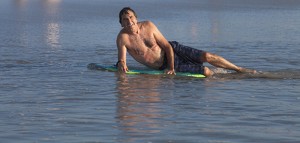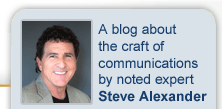“Dad, did you see me?”
 No more than 10 years old, the boy runs out of the surf with his new boogie board tucked firmly under his arm.
No more than 10 years old, the boy runs out of the surf with his new boogie board tucked firmly under his arm.
With a beaming smile, he shouts, “Dad, did you see me?”
And, during my daily barefoot run on the beach, as I glance at him out of the corner of my eye, I realize how much I yearn to ask my dad, long-since-passed from this life, that very same thing.
It’s amazing how young we are when we develop that hunger for affirmation from outside ourselves; how critical it is to developing our self-esteem. Yet, it can be our undoing if we don’t learn to affirm ourselves and gain assurance and re-assurance from the inside out.
I can still remember my dad teaching us the importance of inner-affirmation at a very young age.
I can hear his loving words, “Son, open your hand and spread your fingers wide and count ‘em.
If, when you die, you can count your close friends on one hand, consider yourself fortunate.”
Surrounded by his lifelong friends at the services for his final good-bye, it brought home the reality of that lesson. And in my own life, I count my friends (many of whom have grown from clients to friends over the years) among my greatest blessings.
And so I used that counsel when I eulogized my dad’s passing in October 1997.
And wept.
Knowing his in-person counsel, and love, would be gone forever.
That, and many words of wisdom, coaching and encouragement, prevailed over the years of our lives together as father and son.
Another ‘Dad-ism’ – Grinning when I’d done something well, scored a goal in soccer, celebrated closing night in a school play or figured out how to get my car engine running again, he would sit in his chair and say, “Stand up and put your arms and hands straight out in front of you.
Now, wrap your right hand around in front and reach back over your left shoulder and grab your ‘angel bone’ (as we called our shoulder blades back then). Now, do the same with your left arm, and squeeze as tightly as you can.
Someday, when I’m not around, and no one else is there to pat you on the back, and you’ve done something you’re pleased about, you’ll always be able to hug yourself and pat yourself on the back, and know that you always have it within you to appreciate who you are and what you’ve done.”
How did he know his ‘arm-chair’ philosophy (pun intended – my dad would have liked that!) would shape my life’s work, my career, my relationship with the people I coach, train and team-build?
Along with a team of professional colleagues, I just produced a movie about how folks today can deal with our changing world in light of changes happening on our planet. [More on this new movie in my next blog, or, for an early look, check it out on YouTube, titled, “Answering the Call.”]
We brought together community, business and government leaders, along with world-renowned scientists, to talk about the impacts and opportunities that come from a region, a nation and a world facing drought, extreme weather, changing seas and other realities of our changing climate.
Whether you ‘believe’ (a term I’m told is like ‘believing’ whether or not the earth revolves around the sun – a concept still disputed by 24% of folks surveyed annually who still ‘believe’ the sun revolves around the earth) in a changing climate doesn’t matter; what does is that our world is changing. What matters is what we do about it, and how we work together, for future generations.
What’s this got to do with my dad? And a 10-year old boy on the beach?
Well, we just released the movie. And I was proud to be a part of a group of people – liberal, conservative, practical, theoretical, and all very smart – who came together to work on this production.
As I breathed in during my daily beachfront run, and saw this boy with that big (and hopeful) smile on his face, anticipating his dad’s acknowledgement – the proverbial ‘pat-on-the-back’ – I thought about my dad, and wondered if he’d be proud of me, too.
What would he say?
Would he give me that hug and pat on the back?
And remind me I could reach out my arms and do that when he was gone?
And in that little boy’s face, a stranger whom I will never know, I saw my own.
So many years ago, looking for my loving father, and then again, today.
Saying, “Dad, did you see me?”




